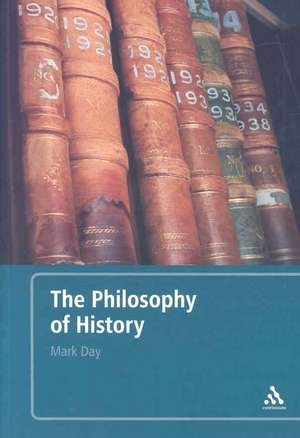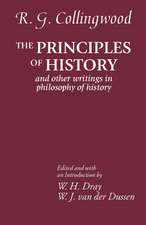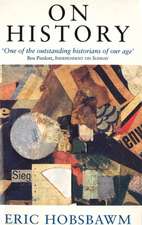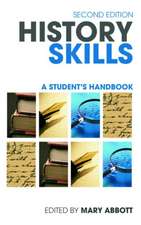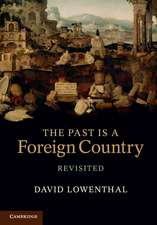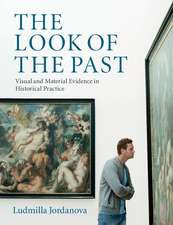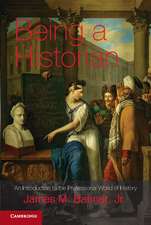The Philosophy of History: An Introduction
Liza Thompson Autor Mark Dayen Limba Engleză Paperback – 30 ian 2008
Preț: 199.56 lei
Nou
Puncte Express: 299
Preț estimativ în valută:
38.19€ • 39.72$ • 31.53£
38.19€ • 39.72$ • 31.53£
Carte tipărită la comandă
Livrare economică 15-29 aprilie
Preluare comenzi: 021 569.72.76
Specificații
ISBN-13: 9780826488480
ISBN-10: 082648848X
Pagini: 272
Dimensiuni: 156 x 234 x 20 mm
Greutate: 0.43 kg
Editura: Bloomsbury Publishing
Colecția Continuum
Locul publicării:London, United Kingdom
ISBN-10: 082648848X
Pagini: 272
Dimensiuni: 156 x 234 x 20 mm
Greutate: 0.43 kg
Editura: Bloomsbury Publishing
Colecția Continuum
Locul publicării:London, United Kingdom
Caracteristici
The competition for this title is exceptionally dated: the two 'classic' guides to the philosophy of history were published in 1951 and 1965 and are no longer widely available.
Cuprins
Preface Part I: Evidence for the PastChapter One: An introduction to historical practice 1. The Past in the Present 2. The professionalisation of history 3. Relations with the Past 4. Forms of historical production 5. Further Reading and Study Questions Chapter Two: Historical methodology1. Scissors and Paste 2. Rules of historical reasoning 3. Peer reviews 4. A philosophical approach to historical reasoning 5. Primary sources 6. Further reading and study questions Chapter Three: Reasoning from the evidence1. Bayesianism 2. The limitations of Bayesianism 3. Explanation and interference 4. Unwinding the spool 5. Explanatory virtues 6. The preservation of testimony 7. Further reading and study questions Part II: History as ScienceChapter Four: Abstraction and laws1. What's so great about science? 2. Abstraction and quantification 3. Positivism 4. Laws 5. Against universality 6. Rehabilitating causation Further reading and study questions Chapter Five: The Causal sciences1. Against causation in history 2. Singular causation 3. Causation and contrasts 4. What is historical theory? 5. Justifying historical theories: comparison and contrast 6. Justifying historical theories: explaining how 7. Further reading and study questions Chapter Six: Theory and particular1. The historian's role 2. A priori argument from particularity 3. Applying in general terms 4. The 'chemical' sciences 5. Combining theories in practice 6. Narrative and theory 7. Interim conclusion: is naturalism the best account of historical practice? 8. Further reading and study questions Part III: History and interpretationChapter Seven: Feeling and thought1. Questions in the philosophy of interpretation 2. Empathy 3. Collingwood and re-enactment 4. Living history 5. All history is the history of thought 6. Further reading and study questions Chapter Eight: Actions, reasons and norms 1. Rationality 2. What is it to act rationally? Instrumentality and re-enactment 3. Meaning and society 4. Social norms 5. The Great Cat Massacre 6. Interim conclusion: interpretation and evidence 7. Further reading and study questions Part IV: From Interpretation to DiscourseChapter Nine: Subject and object1. Historicism 2. Objectivity and evaluation3. Selection and importance 4. Dialogue Further reading and study questions Chapter Ten: Narrative1. What are narratives? 2. Narrative and discourse 3. Metahistory 4. Narrative and truth 5. Collective narrative and metanarrative 6. Further reading and study questions Part V: Truth and RealityChapter Eleven: The absent past1.Overview: correspondence to reality 2. Overview: anti-realism and justification 3. Beyond statement truth 4. Qualified scepticism: degradation over time 5. Construction of the past 6. Present truth and past truth 7. Further reading and study questions Chapter Twelve: Undetermination1.Coherence and choice 2. Bayesianism reconsidered 3. Historiographical disagreement 4. Social construction 5. Linguistic Idealism 6.Practical relations to the past 7. Further reading and study questions ConclusionReferences
Recenzii
'This is the broadest and most updated introduction to the philosophy of history on sale. It is written very clearly and would be an ideal basic textbook for introductions to the philosophy of history and historical methodology.' Dr Aviezer Tucker, School of Politics, Philosophy and International Relations, Queens University, Belfast
'Day raises the philosophy of history to a new level, combining sharp theoretical criticism with a wealth of historical examples. While Mind, Metaphysics, and Morality may remain philosophy's great obsessions, this book will give a real boost to the proper study of History.' Dr George Botterill, University of Sheffield and Hang Seng Centre for Cognitive Studies, UK
'Day's work is intended as a study guide. Its structure and content closely reflect the undergraduate teaching of the philosophy of history, with recommendations for further reading.' Times Higher Education
'Day raises the philosophy of history to a new level, combining sharp theoretical criticism with a wealth of historical examples. While Mind, Metaphysics, and Morality may remain philosophy's great obsessions, this book will give a real boost to the proper study of History.' Dr George Botterill, University of Sheffield and Hang Seng Centre for Cognitive Studies, UK
'Day's work is intended as a study guide. Its structure and content closely reflect the undergraduate teaching of the philosophy of history, with recommendations for further reading.' Times Higher Education
